
54 minute read
BUSINESS
BUSINESS TECH &
Advertisement
ALAN BEEBE President of AmCham China Interview by Ryan Gandolfo
Given this turbulent two-year stretch with the ongoing US-China trade dis pute and COVID-19 pandemic, member services offered at AmCham China would appear to be at a premium. What are your thoughts? The tougher things are, the more you need to share, get smart on the issues and learn from others. AmCham China’s member companies – both large and small – are facing unprecedented chal lenges, which have led to record levels of engagement with our members. Companies have learned to appreciate our incredible value for money by fully leveraging all the Chamber has to offer. Why do you think the global narratives of companies planning to leave China differ from survey results by AmCham China, which suggest companies won’t leave the country in the near future? Our surveys show that companies are not packing up and leaving China; for ex ample, over 70% of respondents say they have no plans yet to relocate production and supply chain operations or sourcing outside of China due to COVID-19. That’s not to say we’re China cheerleaders – our reports are entirely objective and there are plenty of negative trends we’re see ing – but we stick to the data and facts, rather than get carried away by more emotional narratives. We’re proud of the fact that AmCham China is an unparal leled source for credible, on-the-ground information. So, stay rational and critical – and come to us if you want to separate reality from hype!
Companies have been reassessing their supply chain strategies for the last several years, and in certain industries that means diversifying away from China or even expanding operations in the US given the current climate. In our annual China Business Climate Survey Report, 21% of surveyed members reported a drop in revenue in 2019, compared with only 7% in 2017, and the proportion of members describing their financial performance as ‘profitable’ has dropped from 73% in 2017 to 61% in 2019 – the lowest percentage in almost two decades. But despite the financial pressures, in cluding trade tensions and the COVID-19 outbreak, most of the reasons why companies came to China in the first place still hold true today. Growth may be slowing, but most companies are still profitable. China is a historic market op portunity, and companies will continue to invest. Would you briefly explain the China +1 strategy and why more companies may adopt this strategy? The China +1 strategy is a way to diver sify supply chains and operations by adding a new location, typically in Asia. Many Western companies have adopted this in recent years to control costs, and mitigate against rising wages, supply chain issues, tariffs and so on. So while companies show a commitment to Chinese culture and language have a special way of drawing one’s interest, as Alan Beebe could tell you. After completing a one-year internship with IBM in Taiwan, he attended Yale and began studying all things Chinese in graduate school.
Originally from Nebraska in the US Midwest, Beebe felt at home in China when he first moved to the Chinese mainland in 2002. And with 15 years of experience helping foreign and Chinese clients while with IBM and other tech enterprises, he puts all his business experience to good use as President of AmCham China.
In May, we reached out to Alan to hear his thoughts on the business outlook for member companies in China and the ‘China +1’ strategy.

stay the course in China – often pivoting away from an export-led model to more of an ‘in China, for China’ strategy, where goods and services are produced in China for Chinese consumers – we expect to see more companies adopting the China +1 strategy. This is a way to diversify their risks and control costs, while still tapping into China’s market opportunities.
What do you view as the best possible outcome for member companies once the pandemic has subsided and USChina trade talks pick up again? In terms of COVID-19, the best outcome is that companies can fully resume opera tions by perhaps the end of June. From our third flash survey on the impact of the pandemic, conducted in April, 42% of respondents said they had already re sumed normal operations, while 33% said they expected to return to normal by the end of the summer.
As for the trade talks, we hope China and the US stay fully committed to the Phase One deal, and we are helping our member companies take advantage of the USD200 billion in purchasing commit ments included in the scope of this agreement. Beyond that, there are still plenty of tough issues remaining for Phase Two negotiations – especially in technology – that need to be addressed to reorient the bilateral relationship on a more sustain able, balanced economic footing.
TAKE STOCK
TAP THAT APP
Anjuke
Searching for a rental apartment is arguably the least favorite task for people who live in China. For starters, some have to deal with a language barrier between landlords and agents while nonnation als will at times be flat-out rejected from renting out certain flats. (We write from firsthand experience…)
It seems the best strategy for apart ment hunting is to put your eggs in several baskets, one of which should be Anjuke. Although by no means the quin tessential tool to finding your next humble abode, this online real estate platform allows you to search for rental listings in cities across the PRC. When a spot catch es your eye, simply send a message to the agent or landlord to setup a time to visit. If you’re tired of renting and want to go all-in on a home of your own, the app also lists apartments for sale.
Founded in January 2007, Anjuke has been an influential player in the Chinese real estate market, with more than 66 million unique visitors to Anjukeoperated websites per month, accord ing to Crunchbase. The company was acquired by 58.com in a cash deal for USD267 million in 2015.
While Anjuke provides you with a rela tively easy option to finding your next living space, it certainly has its flaws. We’ve learned at times that apartments are already rented out after meeting with the agent, who then shows lesser-attractive housing options. So, try not to get your hopes up if you find a place you really like .
> Anjuke (安居客) is available on iOS and Android.

CHART ATTACK
Locker Losses
Chinese self-service package pick-up stations have started administering fees of RMB0.5 and up for people who collect their kuaidi late. A recent policy by Hive Box, a Shenzhen-based self-service parcel machine operator, has caused pushback in some neighborhoods around China. A survey conducted by Caijing.com found that nearly half of respondents would not accept paying a late fee for packages – agreeing that parcels should be taken to the buyer’s door. Meanwhile, 44% said they’d fork over the cash and 9% said it depends on the fee amount.

Flying Spinner INSPECT-A-GADGET
Every now and then, we find ourselves looking for some light, dumb fun in an attempt to entertain. FlyNova’s flying spinner checks the box – sort of.
Billed as a kind of mini drone, the flying spinner is a simple toy to distract you from your work. All you need to do is turn it on and spin, then it will automatically pick up speed and you can throw across the room, office or outside and it will return like a boomerang (most of the time). It also lights up for when you’re playing with it in darker settings.
While it’s advertised as a good way to de compress, we’d argue there are so many better ways to relax than by playing with this gadget. For starters, the flying spinner is quite loud once you turn it on and begin throwing it around. It can also be a bit difficult to catch since it’s constantly spinning, but don’t worry, your fingers should be fine.
We see this toy as a gag gift for your friend who works at home or dislikes their col leagues. So, if you want to upset Alice from sales with a loud buzzing sound, this will do the trick.

HIGHS AND LOWS


Highs
• China’s auto sales grew 4.4% in April, marking the first sales increase in 21 months. The China Association of Automobile Manufacturers attrib uted the rise in sales to increased demand for commercial vehicles along with government cash subsidies to spur more car purchases. • 81% of advertisers in China feel things are “back to normal,” according to a survey by the World Federation of Advertisers. The survey looked at executives from 24 multinational corporations, with 82% of advertisers saying they invested more in tech and tools to maintain a stable working rela tionship with partners. • Labor Day holiday statistics provided by ride share giant Didi showed the capital city of Urumqi in Xinjiang Uyghur Autonomous Region saw a 571% increase in daily rides compared to a normal week. The city with the second largest increase was Zhongwei, Ningxia, with a 367% spike in daily rides. • Alibaba cofounder Jack Ma topped this year’s list of the 500 richest Chinese people, reportedly earning RMB9.13 million per hour. Not bad, for a former English teacher from Hangzhou.
Lows
• Reports surfaced last month that Apple is planning to shift as much as 20% of production capacity from the Middle Kingdom to neighboring India. The US government has floated the idea of subsidizing moving costs for US companies to leave the PRC, while Japan has earmarked USD2.33 billion to sub sidize Japanese companies’ relocation costs from China. • An experiment by research center Citizen Lab showed that foreign WeChat accounts are subject to surveillance, which could be used to build a database to censor China-registered accounts. A spokesperson from Tencent told CNBC that “all con tent shared among international users of WeChat is private,” following the report.
New Money
On the evening of April 14, screenshots of a beta app showing an e-wallet for China’s new government-backed digital currency were leaked online, effectively setting off a frenzy of speculation both in China and abroad about the future of currency.
It seems only fitting for China to be one of the first countries to launch their own digital currency. After all, they lead the world in digital transactions, accounting for 44% of the global digital payments total transaction value, according to Statista. China’s ‘cashless’ revolution has been well-documented over the past five years, and a new digital currency is another step in the inevitable paper currency phase-out.
But aside from advancing the transition from physical to digital wallets, what else will this currency provide and what might it ac complish in the decades to come?
E-RMB

Since 2014, the People’s Bank of China (PBoC), the nation’s central bank, has pioneered the research behind this new digital tender, and in January 2017, established the Digital Currency Research Institute (DCRI) in Shenzhen to turn these plans into reality.
Essentially an electronic version of the renminbi, China’s Digital Currency Electronic Payment (DCEP) will be used in much the same way we handle banknotes – making payments, withdrawals and deposits – except that these functions will be performed using a digital wallet app. One of its primary func tions is said to be the replacement of MO (money supply).
DCEP is being tested in four Chinese cities – Suzhou, Shenzhen, Chengdu and Xiong’an – in the early trial period. Although no official date for a nationwide rollout has been an nounced, there is speculation that it could be soon.
The move to digital cash makes sense on multiple levels, with commonly cited benefits including reduced costs related to issuing and circulating paper money as well as more ‘hy gienic transactions.’ (The PBoC disposed of old banknotes at the start of the pandemic to curb the spread of the coronavirus.)
DCEP has several key differences from popular cryptocur rencies like bitcoin and ethereum. For starters, it’s a centralized legal tender created and sanctioned by the Chinese govern ment, so China will have full control over the currency’s circulation, and therefore it cannot be mined like other cryptocurrencies. It will be powered by blockchain technology, however the PBoC will have access to currency movement and transaction data. The digital yuan is expected to help prevent illegal activi ties such as money laundering, counterfeiting, illegal financing and tax evasion.
DCEP will be available for transactions offline, and won’t require a bank account to access funds – benefiting the roughly 20% of adults in China without a bank account, according to 2018 data from the World Bank. In addition, it must be accept ed by merchants who take digital payments from other thirdparty platforms, or risk losing their business license.
The digital currency is also expected to have a big impact on monetary policy. At the China Finance 40 Forum in October 2019, Huang Qifan, vice president of the China International Economic Exchange Center, said that DCEP “can achieve realtime collection of data related to money creation, bookkeeping, etc., providing useful reference for the provision of money and the implementation of monetary policies.”
Rising Competition?
In addition to digital currency testing via the four big Chinese banks, Alipay and WeChat Pay are also expected to distrib ute the currency in the future. On Chinese media, some have speculated what type of impact DCEP will have on the mobile payment duopoly, which accounted for 94% of Chinese mobile payments in the third quarter of 2019, according to data from iResearch. Despite DCEP having glaring differences from the mobile payment providers, the digital wallet screenshots post ed in April show a scan-to-pay feature much like we currently use with Alipay and WeChat Pay.
Peng Wensheng, chief economist with Everbright Securities, believes the new currency may compete with existing e-pay ment tools once DCEP is fully launched. “If businesses do not need to pay any fee for using the digital currency, it will take some of the market share of Alipay and WeChat Pay. In the future, digital money issued by the central bank is likely to com pete and compliment the private sector’s electronic payment platforms,” said Peng, as cited by state-run newspaper China Daily . Others view this incoming age of digital currencies as another shake-up for payment firms. “The payment industry is an ancient industry. Merchants have always needed payment ser vice providers, and the transformation of third-party payments has been a focus in recent years. The introduction of more val ue-added services and the transformation of merchants’ digital operations are new opportunities in this industry,” mobile pay ment industry analyst Mu Chu told Time Finance in early May.
However, once DCEP is officially launched, it will still take time to see how the digital currency integrates with current payment systems. During its pilot program, the digital yuan is being used to pay half of government workers’ travel subsidies. Foreign consumer brands like Starbucks and McDonald’s, as well as Ant Financial, Tencent and local restaurants and retail stores, are reportedly participating in some capacity during the testing phase.
A Modern World Currency
Industry experts have speculated that China’s digital currency development really ramped up after Facebook announced plans for its own digital currency, Libra, in June 2019. China Daily reported in September of last year that “Libra’s designing scheme might have sparked new ideas among Chinese financial regula tors.”
Li Lihui, a former Bank of China president who is now involved with blockchain research at the National Internet Finance Association of China, held a webinar in early May titled ‘Digital Currency: Possible Restructuring of the Global Monetary System’ ( 数字货币: 可能重构全球货币体系), discussing the developments of both digital currencies. During the talk, Li expressed that Libra has likely made a lot of progress since its White Paper was released last year. “If Libra was just a draft in 2019, now it probably looks more like a legitimate blue print,” Li said, also noting it has the “potential to fundamentally restructure the global monetary system.”
But what about DCEP? Similar to how finance and blockchain experts like Li have expressed the possibility Libra might disrupt the monetary sys tem, others have pointed out the potential impact that digital yuan can make.
According to Boxmining editor Michael Gu, “the issuance of DCEP is conducive to promoting the internationalization of the RMB and reshap ing the current cross-border payment system.” Currently, the US has a stronghold on crossborder payment and banking systems, with CHIPS (Clearing House Interbank Payments System) being a US company and internationally backed SWIFT (Society for Worldwide Interbank Financial Telecommunication) previously caught sending data to the US. During the Bund Financial Summit in Shanghai last year, Huang Qifan echoed similar sentiments, saying, “Prior to the launch of the RMB Cross-Border Payment System (CIPS), RMB cross-border liquidation was highly dependent on the US SWIFT system and CHIPS. However, there are certain risks associated with a high degree of reliance on SWIFT and CHIPS systems,” including outdated and inefficient infrastructure.
But so far, China’s intentions with DCEP have not been made entirely clear. One of the few take aways from reports in state media is that China’s digital yuan will “showcase to the rest of the world what a genuine digital currency looks like.” The world has now been put on notice.
2014
Special research group set up by People’s Bank of China (PBoC), China’s Central Bank, to study feasibility of issuing legal digital currencies and explore required regulatory framework.
2015
PBoC issues a prototype of the digital currency. Series of research reports issued on digital currency’s computing framework, circulation (for do mestic and overseas), legality, economic and financial impact and more.
April 2020
A screenshot of the Agricultural Bank of China’s e-wallet app fea ture is leaked online, showing functions like scan to pay, send/collect money, touch payment, digital currency exchange, wallet manage ment and more.
February 2020
Two research institutes of the central bank apply for a combined 87 patents related to generation, circulation and recycling of digital currencies.
February 2016
Former PBoC governor Zhou Xiaochuan gives an interview with Caixin, expressing his be lief that digital currency would eventually replace paper cur rency.
February 2017
PBoC launches a digital bill trad ing platform that uses blockchain technology to build and test legal digital currencies.
October 2019
Vice President Huang Qifan from CIEEC said China’s central bank is likely to be the first in the world to launch a legal digital currency.
September 2019
Digital Currency Research Institute releases online course, titled ‘The Frontiers of Fintech: Libra and the Digital Currency Outlook,’ with two courses focused on DCEP in China.
May 2017
Central Bank’s Digital Currency Research Institute is officially launched for researching digital currencies, fintech and other areas.
September 2018
Digital Currency Research Institute establishes the Shenzhen Financial Technology Co., Ltd. which participates in the development of projects like the Bay Area Trade Finance Blockchain Platform, a platform targeting Guangdong, Hong Kong and Macao.
August 2019
At the China Finance 40 Forum, the central bank’s deputy director, Mu Changchun, said its digital cur rency is “ready” after five years of research and successful prototype development.
March 2019
PBoC establishes Yangtze River Delta Financial Technology Co., Ltd. in Suzhou to setup the infrastruc ture for digital currency and complete key technical research and pilot testing.

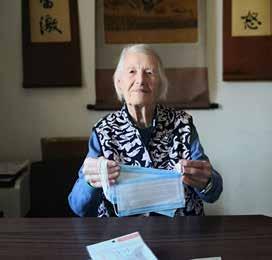
TRAILBLAZERS

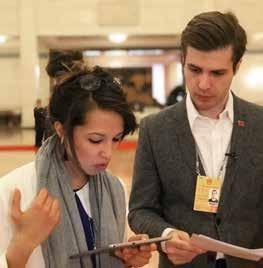


Meet the Internationals Shaking Things Up in the Middle Kingdom
TRAILBLAZERS

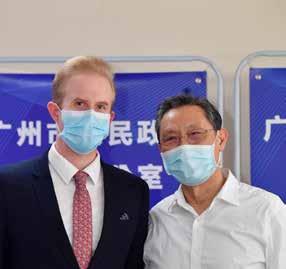

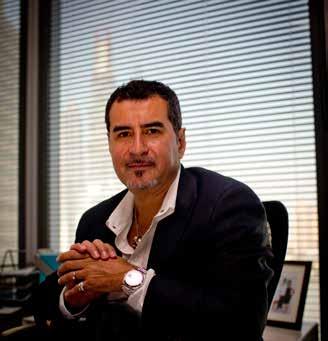

hile many who live in China are familiar with influential Chinese figures, less folks know about the class of individuals originally from abroad who’ve come to China and made their mark. For this month’s cover story, we pull back the curtain on a group of role models who’ve had a defining impact in various fields – from anthropology and sports to business and healthcare. Although each unique in what they bring to the table, all have one mutual redeeming quality – a passion for the Middle Kingdom.
These 10 individuals have found both success and hardship in China, and their stories breed inspiration and dreams of new beginnings. In addition to the successes the people we’ve profiled this month have accomplished while living in China, they all show that home isn’t always where you’re born or where your parents hail from, but where you decide to be. W
Isabel Crook
Chinese Medal of Friendship Recipient By Matthew Bossons
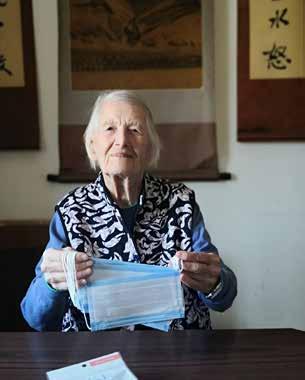
Editor’s note: While it is standard practice to refer to a subject by their family name from the second mention onwards, we will refer to Isabel Crook and her family members by their first names throughout this article due to the number of Crooks mentioned in the story.
Isabel Crook has lived a truly incredible life. Born in Chengdu, Sichuan in December of 1915,
Isabel witnessed some of the biggest events of the 20th century through a Chinese lens, from the first civil war after the fall of the Qing Dynasty and the War of Resistance Against Japanese Aggression (Second Sino-Japanese War) to the Second Civil War leading to the founding of the People’s Republic of China. She also experienced the Cultural Revolution, China’s Reform and Opening-up in the 1980s and the breakup of the Soviet Union.
Isabel’s parents, Homer and Muriel Brown, were Canadian and arrived in China in 1912 as Methodist missionaries. They left in 1942, although their daughter would remain and continues to call the country home to this very day. The 104-year-old has lived 87 years of her life in China, with the remainder spent overseas, including six years in the UK and the duration of her post-secondary education in Canada, where she attained her BA and MA at the University of Toronto.
In the early 1940s, Isabel met committed British communist David Crook and the two were married in 1942. Their life journey together would continue until David’s death in 2000 at the age of 90.
Formally trained as an anthropologist, Isabel is keenly interested in China’s ethnic minority groups, particularly the Yi (previously known as the Lolo) and the Jiarong Tibetan. She is also passionate about rural development. “Isabel enrolled in a PhD program at London School of Economics while David was studying at School of Oriental and African Studies. Her thesis was to be ‘Rural Reconstruction,’ based on her two-year anthropological research done in Xinglongchang in Bishan county, now part of Chongqing in 1940-1942,” Michael Crook, Isabel’s son, tells That’s via email. “When Isabel learned the Chinese communists were launching a land reform program in 1947, she got permission to change her thesis to be a comparison of rural reform under the KMT and Communist Party of China (CPC), and headed out to the communist-controlled areas to do field work and collect material.”
Her husband joined her on this adventure into CPCliberated areas and the couple would jointly produce three books on China’s communist rebirth: Ten Mile Inn, Revolution in a Chinese Village , Ten Mile Inn – Mass movement in a Chinese Village and First Years of Yangyi Commune .
In 1948, on the eve of her return to the UK to finish her PhD, the Foreign Affairs Committee of the CPC asked Isabel and David to stay and teach at the Central Foreign Affairs School (now Beijing Foreign Studies University). There, the couple taught English and other humanities subjects, and Isabel would remain employed there until her retirement in 1979. She then returned to her anthropological studies and wrote two more books.
Despite her parents’ religious affiliation, Crook is not religious and instead took an interest in advancing socialist causes. “Isabel joined the Communist Party of Great Britain (CPGB) in London in 1942, and did union organizing and recruiting for the CPGB,” writes Michael. Within China, Isabel participated in ‘party life’ with members of the CPC from 1947 onwards and in various political movements. She was appointed as an advisor by the Ministry of Education, offering advice on education and social issues, particularly related to rural areas.
Despite the highs, there were lows: During the chaos of the Cultural Revolution, David was wrongly imprisoned for five years for ‘spying,’ and Isabel spent three years in detainment. This experience did not dim their love for China, the Chinese people or the revolution, though, and the Crook family decided to continue living in the PRC despite speculation they may relocate to England.
In a nod to Isabel’s accomplishments and contributions to New China, Chinese President Xi Jinping awarded Isabel the Chinese Medal of Friendship in 2019. The honor sees her join the ranks of other distinguished recipients, including Russian President Vladimir Putin, First Secretary Raúl Modesto Castro Ruz and Princess Maha Chakri Sirindhorn of Thailand.
These days, despite her advanced age, Isabel is still incredibly active, going out multiple times a day despite living on the third floor of a building that does not have an elevator. Unfortunately, due to the COVID-19 outbreak, her regular routines have been negatively impacted.
“Due to the epidemic, the weekly discussion group – supper with foreign friends – has been suspended since January, [this is] something she misses a lot,” Michael tells us.
Considering the trials and tribulations Isabel has tackled during her lifetime, we imagine she is weathering the current global storm with the same determination and adventurous spirit that has kept her in China all these years.
Fuchsia Dunlop Chef and Food Writer By Phoebe Kut
Fuchsia Dunlop’s love affair with China began with a backpacking trip around the country in 1992. She returned home to England smitten with the culture and, like many others who become fascinated with the country, decided to dive deeper by enrolling in evening Chinese lessons. Fast forward 28 years and Dunlop is known in the West as one of the most knowledgeable and authoritative figures on Sichuan cuisine.
Dunlop is a critically acclaimed chef and food writer who specializes in Chinese cuisine, specifically from the province of Sichuan. The passion that was sparked in 1992 has fueled a career spanning decades and resulted in multiple award-winning books.
Her story starts in Oxford, England. If you told a 20-something-year-old Dunlop she’d be a writer, she claims she wouldn’t have believed it. However, she had always held a keen interest in food and cooking. She describes her “very unusual gastronomic upbringing for a girl growing up in England in the 1970s” to That’s. Her mother was an English teacher, who often invited foreign students to live in her home or come over for dinner – and thus Dunlop’s palate was introduced to a myriad of cuisines, including Japanese, Turkish, Spanish, Italian, Lebanese, Iranian and Sudanese. She also enjoyed joining in the action in the kitchen, lending a helping hand with food preparation, cooking and tasting.
Recipes from her mother’s foreign friends were incorporated into her own cooking, and she credits this early exposure to international cuisines as a vital experience in her evolution as a chef. Dunlop acknowledges that her mother was “the most important influence” on her palate.
Following her first trip to Chengdu, Dunlop returned to China in 1994 after winning a British Council scholarship to study at Sichuan University. She decided on Sichuan for two reasons: it was and remains a region rich in cultural history, as it borders Tibet and other minority areas, and it is home to a delicious cuisine. Although she was originally enrolled to study ethnic minorities, she found herself swept up in daily gastronomic discoveries. Dunlop remarks that in Chengdu, “I quickly realized that I was more interested in learning about the local food than anything else – and that was the beginning of my

food-writing career.”
She was invited to become the first foreign student at the Sichuan Institute of Higher Cuisine. During that period of her life, Dunlop lived in China for a year and a half before returning to England. Nevertheless, she’s been coming and going between her home in the UK and China ever since.
Dunlop’s initial goal with writing was to promote understanding and appreciation of Chinese food among English-speaking foreigners. During the late ’80s and ’90s, regional Chinese cuisine had not become as widespread as it is today. Sure, Cantonese and ‘Szechuan’ cuisine had begun to infiltrate Western consciousness, but as we all know, China is a vast country comprised of countless cuisines.
Her first cookbook, Sichuan Cookery was released in 2001 and established her as “the English-writing authority on Sichuanese cuisine,” as summed up by Susan Jung from South China Morning Post.
Although her intended audience were Englishspeaking foreigners, many Chinese people, whether born in China or overseas, have gravitated towards her books. Where Sichuan Cookery stands out is in its ability to break down elements of Chinese cooking that even Chinese cooks or diners take for granted. Just last year, almost 20 years after Sichuan Cookery’s release, Dunlop published an updated cookbook titled The Food of Sichuan, packed with 70 new recipes from the region.
During the coronavirus pandemic, Dunlop has been under lockdown in London. She spends most of her time at home reading, writing and cooking, but hasn’t been able to do any public events, such as the Melbourne Food Festival or the British Library Food Season.
However, she has still found a way to connect to audiences through social media, answering any questions they might have. While some might be baking bread or whipping up Dalgona coffee, Dunlop was touched to see how many people are cooking from her books at home during the lockdown. She has been surprised, yet at the same time delighted, to see “Quite a lot of people in India now seem to be cooking from my Sichuan cookbook!”

Ai Kesen
Footballer for Team Dragon By Ned Kelly
Born Elkeson de Oliveira Cardoso in Maranhão in Brazil, but reborn in China as Ai Kesen (艾克森), the 30-year-old striker made history last September when he became the first person without any known Chinese ancestry to play for China’s national football team. He marked his debut with two goals against the Maldives in a World Cup qualifier.
The unlikely journey began on Christmas Eve 2012, when Guangzhou Evergrande announced they had signed Elkeson from Brazilian side Botafogo for the princely sum of USD6.3 million. He wasted no time making his mark, topping the goal scorer charts with 24 goals in his first season, helping Guangzhou to the Chinese Super League title.
As if that wasn’t enough, he scored a further six goals in the AFC Champions League, including a goal in each of the legs of the Champions League Final against FC Seoul, as Guangzhou were crowned champions of Asia for the first time. In a sign of things to come, Ai Kesen – as he was now known by worshiping fans – draped himself in the China flag as he celebrated the victory.
Fast forward to 2019, and five Chinese Super League wins, two AFC Champions League wins and well over 100 goals later, and it was safe to say Ai Kesen had achieved legend status in China. He was also now eligible for naturalization having lived in the country for five years consecutively. And with football success, including hosting and even winning the World Cup – a stated ambition of President Xi Jinping, and with Team Dragon struggling in qualification for the 2022 World Cup in Qatar, a change in selection policy was approved by the powers that be.
Ai Kesen jumped at the chance to blaze a trail. “I want a new challenge,” he said on social media. “I want to see where my limits are. I am very happy in China; it is my home. I want to say to the world: I have officially started

a new journey – I’m Chinese! I want to return the love of the Chinese people over these seven years. I hope to get your support, as always. I accepted this challenge without hesitation.”
He was not, however, the first naturalized player to represent the national team. That honor went to Londonborn, Arsenal academy product Nico Yennaris, now known as Li Ke, who made his debut last June. The Beijing Guo’an defensive midfielder was naturalized courtesy of his mother’s Chinese heritage.
The pair is set to be the vanguard of a new generation of non-Chinese born players, as the country attempts to make it to a first World Cup since its sole appearance in 2002. Aloisio joined Ai Kesen in China coach Li Tie’s latest squad for a training camp last month, while Goulart, Alan and Fernando are reportedly close to call-ups.
All were born in Brazil. All are contracted to CSL champions Guangzhou Evergrande, as is former England youth defender Tyias Browning, who could also represent China this year. Guangzhou are managed by Italian World Cup winning captain Fabio Cannavaro. The objective is clear.
“China attaches importance to football as much as European and American countries. In terms of investment, it is only comparable to the English Premier League. Football is growing in China and the Chinese team has no reason not to enter the World Cup,” said Ai Kesen, who followed up his two goals against the Maldives with another against Guam, again in a World Cup qualifier.
“With so many players taking Chinese nationality, everyone has the same goal and wants to play in the World Cup,” he concludes. “After all, as a football player, participating in the World Cup is the dream of a lifetime.”

While there is no shortage of foreign editors sprinkled throughout the ranks of Chinese publications and media companies, thoughtful and articulate political columnists are a far rarer breed.
Since moving from the US to Beijing two and a half years ago, Ian Goodrum has built an avid following, thanks largely to his insightful columns in China Daily and People’s World covering geopolitical issues and current events.
The well-spoken 30-year-old originally hails from Brazoria, Texas, a county located roughly an hour south of Houston on the Gulf Coast. From a young age, Goodrum was aware of the economic disparities between different communities in his county. In his college years, he majored in English and took to devouring the texts of the great communist thinkers of the 19th and 20th centuries – including revolutionary and founding father of the People’s Republic of China Mao Zedong.
“China was a place that I had always been interested in,” says Goodrum. “In college, I was reading Marx, Lenin, Engels and Mao, and Mao was one of the writers that really struck me the most in terms of what I had experienced and what I knew about the way the world works.”
Upon graduating from college, Goodrum jumped into the world of American media, working as a column and feature writer, as well as an occasional reporter. But in a turn of events that is all too familiar to people working in media, he was laid off just before the 2016 election.
“It’s hard enough finding a job in journalism anyway, but it’s even harder when you are looking at the same time as 300-plus other people with varying levels of experience and backgrounds,” Goodrum tells us. “I was getting some responses, but nothing was super forthcoming, so the thought came to me that I should start looking outside of the country.”
His job search eventually landed him with Englishlanguage newspaper and digital media company China Daily in Beijing. While the job offer from China Daily was the chief motivator for the overseas move, Goodrum says that he was interested in coming to China to learn more about the media landscape here versus what he had experienced in the US. He did have some reservations, though.
As a Leftist, Goodrum admits he was skeptical of modern China’s revolutionary credentials, although he says that these misgivings quickly dissipated after researching into modern China’s policies and governance. They were further dispelled after arriving in the country.
“Getting to go to some of these villages where the poverty alleviation campaigns are in full swing, where there are new houses being built, where people are getting public services – many of them for the first time, these actions are being taken by the government. This solidified my turnaround and solidified my support [for China’s government],” says Goodrum.
The Texan’s day-to-day job sees him working as an editor, although he regularly releases columns tackling diverse topics for an international audience, from the US-China trade war and last year’s NBA scandal to Karl Marx’s legacy and the Two Sessions.
While Goodrum tells That’s that he enjoys total autonomy in choosing his topics, he does note that much
Ian Goodrum
China Daily Editor and Columnist By Matthew Bossons
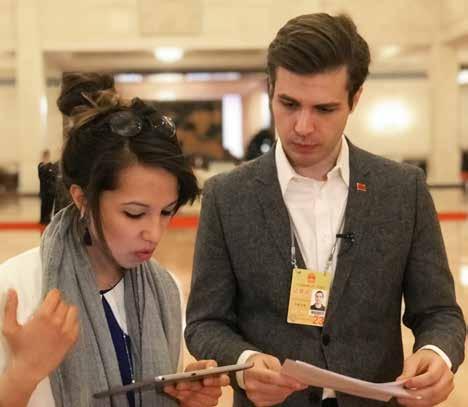
of his time has been spent responding to anti-China rhetoric and misinformation in Western media and political circles. This has become a full-time job in recent years, and even more so over the past several months, with American officials regularly referring to COVID-19 as the ‘China Virus’ and US Secretary of State Mike Pompeo’s baseless assertion that the disease originated in a Chinese lab.
“I got here right before the anti-China machine really got kicked into high gear, so most of my work has been responding to what is being said about China in the West. When you decide to not abide by a lot of these [antiChina] narratives, you find yourself on the back foot a lot of the time and you are responding and defending rather than being proactive and creating,” says Goodrum.
His dedication to providing an inside look at Chinese politics for domestic and international audiences has earned him a considerable following. Since arriving in China, his Twitter following has grown from roughly 1,000 followers to more than 25,000. He’s also been featured on prominent podcasts and given lectures on his experiences in China and his thoughts on China’s quickly evolving role on the global stage.
With no plans to leave China in the near future, expect big things from Mr. Goodrum in the years to come.
Harry
‘Hazza’Harding TV and Radio Presenter of Guangdong Radio and Television
Harry Harding’s China story is a testament to taking advantage of the opportunities presented to you. Born in Queensland, Australia, Harding (known by most as Hazza) was first introduced to China after bypassing a program to hike in the Australian bush in order to go on a school trip to Beijing.
“Hiking in the bush or hiking on the Great Wall, which one are you going to choose?” he says, recalling that early experience from his Guangzhou apartment. However, the capital city tour didn’t necessarily spark his interest in the country north of Down Under. No, that moment occurred after Harding discovered a Jay Chou album.
Without the Chinese skills to understand Chou’s beloved ballads, Harding managed to substitute his math courses for Chinese in Year 11, which led to a major in Applied Linguistics and dual minor in Mandarin and Korean at Griffith University.
By this time, Harding had started creating videos singing Chinese cover songs and sharing them on Chinese social media sites. “When I was in Australia, one of my videos went viral and it made the news. It received millions of hits online. Even Chinese people in Australia would come up to me and say, ‘Are you that guy that sings Chinese songs?’” Harding recalls with a chuckle.
Eventually, his cover song viral hits led him back to China in early 2011, with a woman contacting Harding about potential opportunities in the capital city. After the airline lost his luggage when he arrived in Beijing during the dead of winter, he decided to travel to ‘warmer’ pastures and ended up in Guangzhou. From there, he would go on to meet someone from GRT (formerly called GDTV) and start a new career in Chinese radio and television.
Harding has, for the most part, worked as a TV presenter and radio host for GRT throughout his career. “I feel like here, in China, it’s not every day you would turn on the TV and see an Australian,” Harding tells us, while pointing out that there are a lot of misunderstandings between Australians and Chinese people. As the chapter president of the Australia China Young Professionals Initiative in Guangzhou, Harding has the ability to help others learn and appreciate both worlds by organizing meetups. “It’s about connecting the
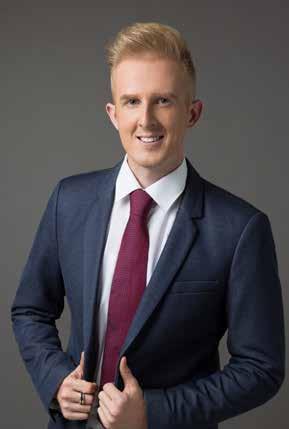
community,” he says.
His work in Chinese media has been exemplary, having received the China News Award in 2017 for a program looking at how technology made in Guangdong province was being applied in Australia. Viewed as one of the most prestigious journalism awards in the PRC, Harding is the first Australian to receive the honor. In addition to news reporting, he has put in time on various talk shows, including China Chats and FaceTime, as well as a program called Little Ma Big Ha which goes in-depth on cultural differences between China and the West.
While highly regarded for his work in media, Harding’s entertainment career has been equally impressive. He was named the ‘Most Popular Internet Celebrity’ in 2011 by video-sharing platform 56.com for his masterful covers of Jay Chou classics. Having graduated from covering Chinese songs, Harding released several of his own singles, including debut song ‘Let Go,’ which hit number one on the Guangzhou New Music Charts.
When looking back at some defining life-changing moments, Harding shares two that stand out. “I was a supporting act at a concert with JJ Lin in Guangzhou, with an audience of 60,000 people,” he says, mentioning that he later got to meet JJ Lin and G.E.M. “That was like a lifechanging moment because I’ve always had stage fright and I got over it on that night.”
The other moment he references is saying yes to that first job at the TV station in Guangzhou. “There were still so many unanswered questions at the time, but if I said no then my life would have gone in a totally different direction.”
Throughout his career in China, Harding has been able to have a positive impact within the Chinese and international communities. As for advice he’d give nonnationals living in the Middle Kingdom, he says to go with the flow: “If every time you come up against a challenge and treat it like it’s the end of the world, you’re going to have such a depressing time. There’s 1.4 billion people here and they all manage, so why can’t you?” Harding expresses, “You can’t change other people, the only thing you can change is your input in those interactions. Honestly, there are no other ways you can go about living in China.”
Roberta Lipson
CEO of New Frontier Health By Phoebe Kut
Call it fortune or call it foresight, Roberta Lipson dialed into China’s potential for opportunity early on. She first moved to Beijing from New York shortly after China’s Cultural Revolution. Since her move from the bright lights of the Big Apple, she has firmly established herself within the Chinese business community as the CEO of New Frontier Health, which owns United Family Healthcare (UFH), a private healthcare operator in China worth USD1.4 billion.
Lipson reveals to That’s that she had been drawn to China from an early age. In university, she majored in Chinese history and after graduation was determined “to do anything” to make her way to China. However, as US-China relations were still in a fledgling stage, there were few jobs available at the time.
She decided to follow her passion for healthcare and soon landed a job at a pharmaceutical company in the US, putting her dream of moving to China on a temporary hold. Nevertheless, she remained resolute that she would grasp the first suitable opportunity to work in China when it came along. That opportunity came in 1979.
When she arrived in Beijing, the healthcare market was more or less removed from the outside world. Lipson was quick to recognize that US-manufactured medical equipment could considerably raise the standard of healthcare in the country.
On her first job in China, Lipson managed a business importing medical equipment. “We were bringing tools to doctors which they wouldn’t have access to otherwise,” she tells us. Following that pivotal experience, Lipson cofounded her first company, Chindex International, with colleague Elyse Beth Silverberg in 1982.
In the ’80s, through becoming familiar with the inner workings of hospitals by supplying equipment to them, Lipson saw a gap in the market for international-standard hospitals and practices. Her realization coincided in a timely manner with a rapidly growing Beijing expat community that craved similar healthcare standards to those at home. In addition, after accompanying a friend to a Chinese maternity hospital and witnessing the stark difference in care between Chinese and Western hospitals, she recalls feeling that it was unfair for Chinese women “to have the happiest moment of their lifetime delivered in such an unsatisfactory way.” Thus, the concept of UFH was born, along with a vision to be a premium healthcare provider and one of China’s largest private operators.

Presently, UFH has established hospitals and clinics in Beijing, Shanghai, Guangzhou, Tianjin, Qingdao and Bo’ao, while another hospital is currently under construction in Shenzhen. Lipson describes how the Chinese patient base at UFH has grown from 40% in 2010 to 74% this year, vindicating UFH’s model in the Chinese market. Furthermore, UFH prides itself on being an international, multicultural and diverse environment, exemplified by a workforce that is over 70% female.
Since the opening of UFH in 1997, the hospital has pioneered the concept of high-quality private healthcare in China. Of UFH’s accomplishments, one of Lipson’s most gratifying experiences has been changing the perspective on childbirth – from one of dread and uncertainty into an empowering experience. She notes, “it should be a celebration with your family around, and [one] should have [the option of] pain control to make it a safe and positive experience.” During the early ’90s, very few hospitals offered women epidurals to manage the pain of childbirth, making the experience that much more challenging.
Upon reflecting on her time in China, Lipson tells us the three things of which she is proudest. The first is building a hospital brand that has not only been financially successful, but has also helped changed how healthcare can and should be provided in China. The second is UFH’s ongoing foundation work, which has provided free healthcare for orphans, people outside of the social safety net and those with serious medical conditions. Lastly, she is proud of the foundation’s leadership efforts when it comes to cervical cancer and HPV screening.
Despite all of Lipson’s business ventures, she still finds time to remain connected to her Jewish faith. Lipson cofounded Kehillat Beijing shortly upon arrival to the city, which to this day serves as a place of gathering and community for many of Beijing’s Jewish population.
With three (now grown) children all raised in China, Lipson reflects, “I would say China is one of the best places in the world to raise a family.” She explains, “Chinese people love children and there’s great maternity leave benefits for mothers and in some cases paternity benefits. In addition, UFH is a place where you can have one of the best birthing experiences and where childcare is still fairly affordable for professionals in China. Even if you don’t have a relative looking after your child, there are still wonderful people to help raise the family.” COVER STORY
43
Michael Luevano
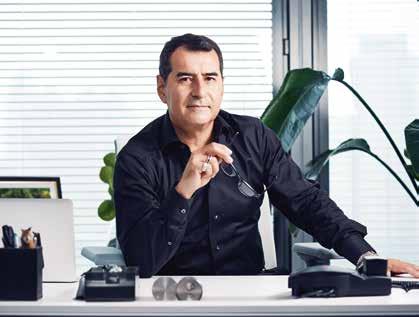
When it comes to organizing major international sporting events in China, Michael Luevano is the man. Tournament director of the Rolex Shanghai Masters, he also oversees the F1 Chinese Grand Prix, equestrian Global Champions Tour and annual AFL game. Oh, and he’s put on Shanghai shows for Elton John, Eric Clapton and the Rolling Stones for good measure.
A South California native, Luevano started out as a tennis pro, playing in “tournaments that were so poorly run that I was confident I could do better organizing the events myself.” In 1987, he met his business partner of over three decades, Charles Smith, in San Juan, Puerto Rico, where Luevano’s day job was as a teaching pro for Peter Burwash International.
“Ironically, there were two Peter Burwash pros working in Hong Kong that had also started a sports marketing and event management company like Charles and I had in Puerto Rico. Those two guys owned the ATP Tour event in Oahu, Hawaii and contacted us to see if we had interest in operating the event,” says Luevano. “Hawaii definitely intrigued us, so we packed our bags and moved there to run the one and only Hawaii Open in 1994.”
The tournament was “a complete financial disaster,” but that didn’t prevent an offer for their next opportunity, and Luevano found himself on a plane to the Far East and the next chapter of his life. He became tournament director of the Salem Open in Hong Kong for the next four years, one of 30 events Luevano did each year for a wide variety of sports, from table tennis to badminton, volleyball to tennis. His first trip to Shanghai came in 1995.
“At the time there were no Western sports marketing companies based on the Chinese mainland. Most were in Hong Kong; you flew into the mainland, worked the event and then flew out. That experience helped me understand how to navigate the mainland, and by the time I finished my contract with the Hong Kong entity, I was ready to move to Shanghai,” Luevano tells us.
In 1998, Luevano and Smith landed the contract for what was to become the Heineken Open, where they brought in a big name that made a difference. “One of the shrewdest strategic decisions we made at the outset was to do a threeyear deal with Michael Chang,” Luevano recounts. “He was unique in that he was of Chinese heritage and a bona fide superstar as the No. 2 player in the world. It certainly worked to our advantage that he ended up winning that first Heineken Open.”
The growth and success of the Heineken Open – now the Rolex Shanghai Masters – led them to another major prize in the sporting world. “We became involved in F1 in 2006, and the race has steadily flourished. For the last four years, the race, which is now staged in one of the venues we own, has sold out, and is considered a premier race on the international F1 calendar.”
As vice president and executive director for the international division at Shanghai Juss Event Management, Co., Inc., Luevano added equestrian and Aussie Rules events to the company portfolio, while they now own the Shanghai Sharks basketball franchise. And then there’s rock ‘n’ roll.
“When I’m not wearing my sports marketing suit and tie, I’m also a musician. I’ve played the drums since I was an early teen and have been in multiple bands, so I’ve always driven the music side of our business,” says Luevano. “Working with major acts like the Rolling Stones and Sir Elton John were probably the most stressful times in our entire careers. They checked all our boxes, especially the Rolling Stones. They were an iconic, bestin-class group.”
All of which earned Luevano the Silver Magnolia Award, given out to foreigners who’ve made an impact on the city, in 2005, and then Shanghai’s highest honor, the Golden Magnolia Award, in 2015. “Charles has also received the same two awards in different years. What the award really did for us was solidify that Shanghai is our home and we’re truly, truly proud to be honored by our city.”
Now in the first year of another 10-year contract with Juss, Luevano will be making big things happen in Shanghai through much of his 60s. “I believe the future holds great things. I do have another dream that I’ll tell you about. I’d love to do an air show in Shanghai.”
With Michael Luevano, the sky’s the limit.
Mamahuhu
The Comedy Skit Video Troupe Everyone Knows By Matthew Bossons
The team behind comedy troupe Mamahuhu are unquestionably among China’s most celebrated entertainers. From their hallowed ranks a number of seriously talented expatriate comedians and entertainers got their starts, including American Zach ‘Donnie Does’ Etkind, who now works for Barstool Sports, and Australian Andy Curtain, a Hong Kongbased comedian who has a Comedy Central special coming out later this year.
For the uninitiated, Mamahuhu releases regular videos that highlight cultural differences between Shanghainese people and their expatriate neighbors through comedic skits. The group, which was originally comprised of Alessio Avezzano, Matt McGill, Johnny Tian and Kay Wang, got their start filming lackluster pranks and ‘social experiments’ with TMD back in 2014.
“At the time, that company were keen on us making ‘social experiments’ until I convinced them to allow us to give sketches and shorts a try,” Mamahuhu’s director and cinematographer Avezzano tells That’s via email. “The channel blew up after that. Later that year, I would leave the company to go solo and wouldn’t be given the channel back until two years later when TMD was no more.”
Since making a comeback in 2017, the creative minds behind Mamahuhu have released a string of wildly popular videos, including ‘The Last Man in Shanghai,’ the ‘Laowai Park’ series and the hilarious fake commercial ‘The Ayi From Work Diet.’
“We’ve been really fortunate to have had this great little



comedy bubble made up of talented writers and comedians. Most [video ideas] come from daily observations that are then greatly exaggerated; cultural differences of course have played a huge part as well,” writes Avezzano. “If the idea makes us laugh, that’s usually enough.”
Due to the transient nature of expat life, the core members of the group have changed over the years. In addition to Avezzano, the current team includes expats Matt McGill, Andy Curtain, Adam Hamilton and Mohammed Magdi, as well as Chinese citizens Dawn Wong and Norah Yang, among others.
One thing that hasn’t changed, though, is the time and commitment required to produce each and every Mamahuhu video. Additionally, filming on Shanghai’s noise-plagued streets have also proved to be an obstacle.
“Time and budget have always been the biggest challenges [and] filming on the street, working around noise pollution,” says Avezzano, “I swear there’s a guy with a drill that shows up at every shoot no matter where we are.”
As a result of the troupe’s creative comedy skits, they’ve amassed a considerable online following, with over 194,000 subscribers on YouTube and over 54,000 followers on Facebook.
“Our viewers have grown globally over the years, YouTube being our biggest audience and perhaps WeChat second,” Avezzano tells us, adding “We’ve all grown into better filmmakers and storytellers as a result of the channel and we hope to push our skills beyond short-form content in the future.”
And moving beyond short videos appears to be very much in the cards, with the team set to soon release a 30-minute video called ‘Scarlett, Shanghai & Me,’ in addition to pitching TV series and film ideas based on the Mamahuhu channel.
Stephon Marbury
Head Coach of Beijing Royal Fighters By Ryan Gandolfo
Stephon Marbury has lived his best life in China, moving to the Middle Kingdom in 2010 to play in the Chinese Basketball Association (CBA) following an abrupt end to his career in the NBA. Over the past decade, the star point guard nicknamed ‘Starbury’ has felt the love of a nation, brought the first-ever basketball championship (and then two more) to Beijing and truly immersed himself in the local culture. He’s also become an icon and role model for millions of young Chinese ballers.
Born and raised in Brooklyn, New York, Marbury played for two CBA teams – the Shanxi Dragons and Foshan Dralions – prior to his start with the Beijing Ducks. In his first season with the Ducks, he averaged 25 points per game and eventually led them to a championship over then seven-time champion Guangdong Southern Tigers. Following the championship season, Marbury credited his success to Chinese culture, saying it was one “filled with love, compassion and care.” Marbury went on to win two more championships with the Ducks and eventually finished his career with the Beijing Fly Dragons in 2018. As a way to immortalize Marbury, a life-size statue of the star player was built in Beijing. He also has his own


museum dedicated to his basketball career and a musical ( I Am Marbury ) and movie (My Other Home) based on his story in China.
To sum up Marbury’s impact on the Beijing Ducks, here’s what one Beijinger told That’s during the CBA finals in 2015: “Lao Ma [Stephon Marbury] is definitely the backbone of the whole team. The other players – as well as all fans of the Ducks – appreciate and speak highly of his vital role in the team … the team has been so positively influenced by Lao Ma. In victory or defeat, he never gives up and keeps fighting until the last second.”
Although he has no shortage of supporters, fanatics from opposing teams are less inspired by Marbury’s play, like Shanghai Sharks super fan Zach Etkind (aka ‘Donnie Does’ aka ‘The Shark Knight’). “Once he steps in the ‘Shark Tank,’ all bridges collapse,” Etkind said of Marbury playing against his favorite team on one of his popular vlogs.
Marbury has consistently shown an admiration for China and its people. In an exclusive interview with Bleacher Report in 2015, he said, “Nothing can compare to my experience in China. My situation is fortunate because I actually love it there and I love it because of the people. For what they did to me, I’m forever invested into that country. Living there has been great for me and great for my life.” So great, in fact, that Marbury became a permanent resident of China in 2016, becoming the first foreign player to receive China’s rare ‘green card’ in the CBA’s history. He took to Weibo to express his gratitude, writing, “It’s a true honor to be part of the capital of China.”
After retiring in 2018, Marbury made the transition to coaching, and he presently serves as the head coach of the Beijing Royal Fighters.
He remains an influential member of communities in Beijing and his home state. During the ongoing COVID-19 pandemic, Marbury was working with a Chinese company to sell 10 million masks to Brooklyn at cost – at a time when masks were increasingly difficult to acquire. It echoes what Marbury is so often about – helping out those in need.
While he’s certainly made himself a lot of money playing the game of basketball and developing his brand into a moneymaker, he’s also the same guy who sold a solid, stylish basketball sneaker at a low cost so people could afford it. It speaks volumes for his desire to do good, and an attribute many here in China have likely became acquainted with and respect as well.
Dr. Allan Zeman
Chairman of Lan Kwai Fong Group By Ryan Gandolfo
We know of very few people as devoted to their city as Dr. Allan Zeman. Known as Mr. Lan Kwai Fong for his role in developing one of the liveliest entertainment districts in Hong Kong, Zeman has encapsulated the invigorating entrepreneurial spirit of Hong Kong since he first arrived in the ’70s.
Born in Germany post-World War II and raised in Canada, Zeman’s early life was disrupted with the passing of his father when he was 7 years old.
“We didn’t come from a wealthy family, but I guess I was always a risk-taker, a calculated risk-taker,” he tells us over a video call, sporting his classic look – an open neck shirt with an upturned collar – from a meeting room in Hong Kong.
Zeman left school and joined the fashion industry at 16, and started his own business at the age of 19. “I always thought if someone else can do it then why can’t I?”
His first company, called Jump for Charlie, earned USD1 million in profit in its first year, with the young entrepreneur making sourcing trips to Hong Kong, which he refers to as the “factory of the world” during those days. He eventually decided to move to Hong Kong in 1975, in part due to the much lower 15% corporate tax rate at the time. But Hong Kong’s lure extended far beyond financial gains.
“Hong Kong was a place you can have a dream at night and the next day make it a reality,” Zeman says about his early days living in the city. He would go on to start a successful trading company, Colby Trading Group, opening 35 offices around the world, including an early outpost in Changsha, Hunan province. “The reason I went to Hunan was that it was the birthplace of Chairman Mao and at that time, as a young kid, I figured it was kind of the office of China,” Zeman recalls, noting how the electricity would go off in the nighttime so they’d play ping pong by candlelight. “I learned very quickly about doing business in China, and my experience at such an early stage was amazing. I love China, and even at that time the people were very innocent, very open to new ideas and they hadn’t seen many foreigners in those years.”
Zeman and longtime partner and friend Bruce Rockowitz would later go on to sell Colby Trading Group to competitor Li & Fung for HKD2.2 billion in 2000.
Zeman’s portfolio of businesses expanded greatly in the ’80s and ’90s, many of which started in Lan Kwai Fong. Under his stewardship, the area in Central became a nightlife hotspot – a concept that Zeman has exported to Chinese mainland cities like Shanghai and Chengdu. In 2003, Zeman was appointed chairman of amusement park Ocean Park by former Chief Executive of Hong Kong Tung Chee-Hwa. He would go on to have a significant role in rejuvenating and redeveloping the park over his 11-year tenure, and effectively thwarted the big opening of Hong Kong Disneyland in 2005. “I beat Disney, which no one has ever done in the world and Forbes magazine


dubbed me as ‘Mouse Killer,’ and so it was a big loss of face for Disney … that name has stuck with me.”
As chairman of Lan Kwai Fong Holdings, Zeman continues to influence various industries both in China and Asia at large. But his contributions in the political sphere, where he sits on different committees for government and is an advisor to Chief Executive Carrie Lam, are unique. “I feel that I’m kind of a bridge between the Western and Eastern worlds, especially with China. If there are things they want to understand, or they are not sure about something going on, I get calls and try to help them understand,” he tells us.
In 2008, Zeman decided to give up his Canadian passport and become Chinese. “I’ve done so much for Hong Kong and China I just felt it’s my home and I don’t have another home now, so I feel – with my family and kids here – this is home,” he tells us, expressing he feels he “made the right decision.”





